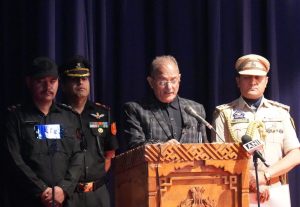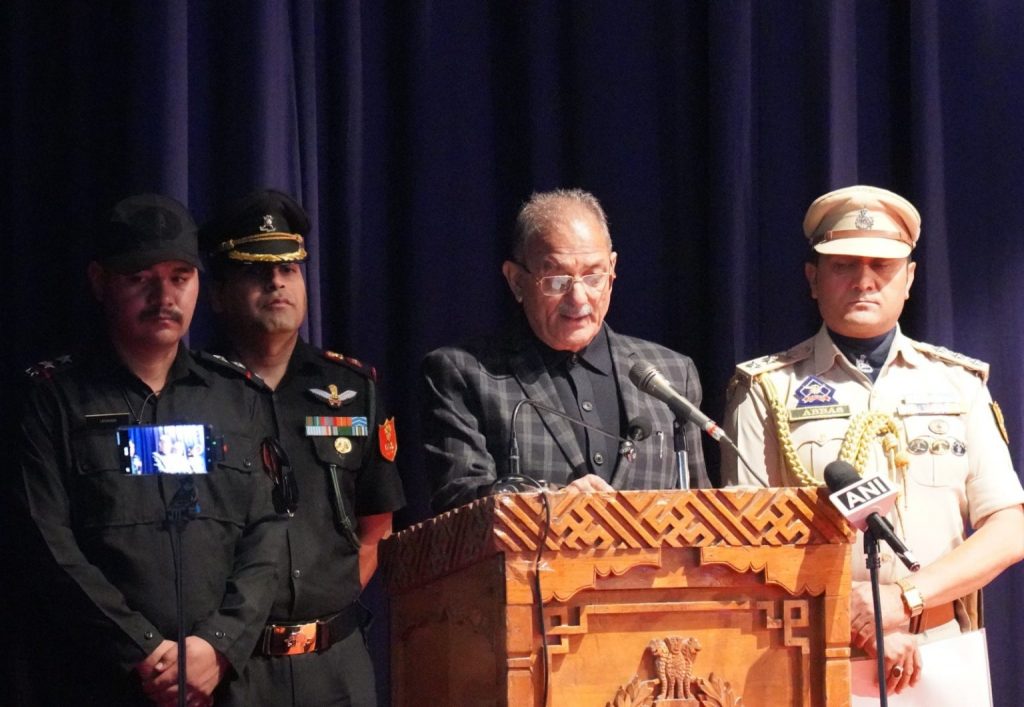Leh, Sept 1: India ushered in a historic reform of its criminal justice system on July 1, 2024, with the implementation of three new laws—the Bharatiya Nyaya Sanhita (BNS), Bharatiya Nagarik Suraksha Sanhita (BNSS), and Bharatiya Sakshya Adhiniyam (BSA). These laws replace the colonial-era legislation with a framework aimed at ensuring faster justice, empowering victims, strengthening the use of technology, and safeguarding citizens’ rights.
This was stated by the Lieutenant Governor of Ladakh, Kavinder Gupta, while inaugurating a two-day exhibition on the new criminal laws organised by Ladakh Police at the Arya Nagarjuna Auditorium Hall at Central Institute of Buddhist Studies (CIBS), Choglamsar. He was accompanied by First Lady, Smt Bindu Gupta.
The event was attended by LAHDC Leh Deputy Chairman, Tsering Angchuk; Chief Secretary Dr. Pawan Kotwal, DGP Ladakh Dr. S.D. Singh Jamwal, Executive Councillors and Councillors from LAHDC Leh; Principal Secretary, Sanjeev Khirwar; Principal District and Sessions Judge, Leh, Manoj Parihar; head of religious, political organisations, members of Civil Society Organisations, former MP Ladakh, Jamyang Tsering Namgyal; Vice-Chancellor, UoL, Prof Saket Kushwaha; Vice-Chancellor, CIBS, Prof Rajesh Ranjan; officials from Ladakh Police, heads of departments, government officials and students from various schools were present during the occasion.
The Lt Governor said that the new laws reflect the Prime Minister’s vision of a transparent, citizen-centric, and technology-driven justice system that delivers to the last mile. He added that under the leadership of Prime Minister Narendra Modi, India has taken a decisive step towards replacing outdated colonial frameworks with a legal system rooted in the spirit of justice, equality, and modern governance. These reforms, he said, are not just about legal provisions but about transforming the justice delivery mechanism to make it faster, more accessible, and responsive to the needs of every citizen, including those living in remote regions like Ladakh.”
The Lt Governor highlighted Ladakh’s preparedness in adopting the new laws, commending Ladakh Police for providing extensive training to personnel, equipping investigating officers with tablets and CUG SIMs for digital evidence collection, and conducting mock drills across districts. He said Ladakh Police had also taken initiatives to spread awareness among citizens through social media, TV, radio, schools, colleges, trade unions, women’s groups, and NGOs.
Applauding their achievements, Shri Gupta noted that Kargil Police Station became the first in the country to register a case under the new laws, filing a chargesheet within five days and securing conviction. He also mentioned that the Zero FIR system has been successfully integrated with CCTNS, Ladakh has become the first UT to adopt MedLEaPR for instant medico-legal reports, and all police stations have been connected to the CCTNS CAS application for transparent and digital case management.
“This exhibition reflects our commitment to a citizen-centric and technology-driven justice system. Through live demos, mock cases, and digital policing displays, people can see how the new framework is being implemented effectively in Ladakh,” the Lt Governor said and congratulated Ladakh Police and nodal officers for their tireless efforts and expressed hope that the two-day programme would prove highly beneficial for all.
Chief Secretary Dr. Pawan Kotwal, IAS, in his address, informed the audience about the criminal laws introduced during the British era and the recent enactment of three new criminal laws aimed at replacing them to ensure speedy justice through the use of modern technology. He underlined the provision of community service as a new form of punishment that would help reduce the number of undertrials in prisons. He also highlighted the efforts of the UT Ladakh Administration to establish a strong prosecuting wing and set up a modern, fully equipped forensic laboratory in the Union Territory.
DGP Ladakh, Dr. S.D. Singh Jamwal, IPS, in his address, highlighted the challenges faced by the Ladakh Police in implementing the new criminal laws in the region. He, however, praised the force for being one of the pioneering police units in India to enforce these laws despite Ladakh being a newly formed Union Territory. He expressed hope that the new laws would contribute to a crime-free society in Ladakh and inspire more young people to join the police force.
Earlier, a play on the BNSS Act 2023 was also performed on the occasion.


